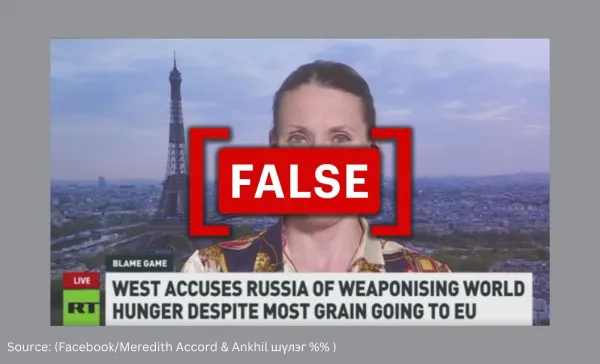By: Emmi Kivi
August 1 2023

Europe received 38 percent of the grain in the Black Sea Grain Initiative. Developing countries are the biggest beneficiaries of the initiative.
Context
A Facebook post claims that the vast majority of the Black Sea Grain Initiative grain goes to Europe to feed livestock, not those most in need, namely African states. The post distributed a news broadcast from the Russian-backed news television network RT. The video has 47,000 views, and similar claims have circulated on Twitter and TikTok.
The claim aligns with a recurring pro-Kremlin disinformation narrative, which seeks to deflect blame for the global food crisis to Europe. This narrative has resurfaced following Russia’s decision not to extend the Black Sea Grain Initiative on July 17, 2023, and en route to the second Russia-Africa Summit on July 27 and 28, 2023.
In Fact
Through the Black Sea Grain Initiative, 38 percent of grain deliveries went to Europe, according to U.N. data. From the 32.8 million metric tonnes of grain exported, just over 12.5 million metric tonnes were destined for Europe. The United Nations Conference on Trade and Development (UNCTAD) reports that developing countries are the biggest beneficiaries of the initiative; the least developed and other developing countries received 55 percent of all food exports and 65 percent of wheat exports. Furthermore, Ukrainian wheat exports to the least developed countries have more than doubled compared to February 2022.
Ukraine and Russia are among the world’s top grain exporters. In July 2022, Ukraine, Turkey, and Russia signed the Black Sea Grain Initiative brokered by the U.N. The objective was to grant the safe export of grain, fertilizers, and other foodstuff from the Ukrainian Black Sea ports – Odesa, Chornomorsk, and Pivdennyi – through a maritime humanitarian corridor. So far, food commodities have been exported to 45 countries across three continents, mainly in Africa and Asia.
According to the U.N. Secretary-General, the initiative plays an “indispensable role” in global food security. Since July 2022, Ukraine has supplied over half of the U.N. World Food Programme’s (WFP) wheat grain through the Initiative. The WFP has delivered 725,167 tonnes of wheat in humanitarian shipments to Ethiopia, Kenya, Somalia, Sudan, and other countries most affected by the food and price crisis. By July 2023, the program had obtained 80 percent of the year’s purchases of wheat grain from Ukraine before the Initiative terminated.
Before the Black Sea Grain Initiative, 40 million tonnes of grain were stuck in Ukraine due to the port blockade, which exacerbated scarcity and increased global food prices. The EU established a logistics platform to release Ukrainian exports: the EU-Ukraine Solidarity Lanes. Sixty percent of Ukraine’s grain was exported through Solidarity Lanes, along with other agricultural products. The release of Ukrainian exports contributed to stabilizing global markets and reduced food costs. Despite wealthier countries purchasing grain, the surplus supply was also devaluing the overall price paid by all countries.
The Verdict
Thirty-eight percent of the Black Sea Grain Initiative grain goes to European countries, while those considered least developed and other developing countries received 55 percent of all food exports. Through the initiative, Ukraine contributed to humanitarian shipments to countries most in need: it supplied over half of the wheat grain for the U.N. World Food Programme in 2022. The release of Ukrainian exports contributed to reduce global food costs. Therefore, we have marked this claim as false.